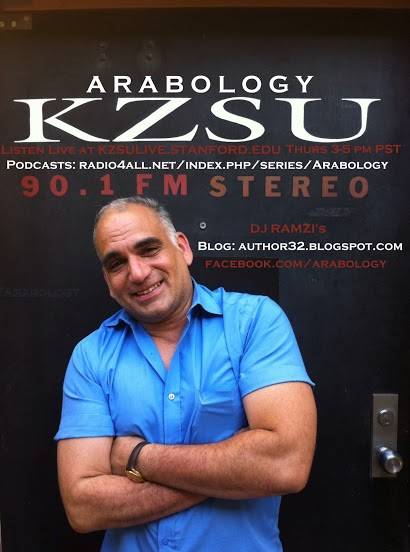From Beirut to the Bay: A Talk with Radio Host Dr. Ramzi Salti
Thanks to the internet, the music of today knows no borders, and that’s good news for alternative Arab artists whose less-than-commercial music now has a chance to be heard by the general public, both regionally and elsewhere. One man who strives to spread the music of such artists in the US is Dr. Ramzi Salti, lecturer at Stanford University and host of the radio show Arabology on KZSU 90.1 FM (San Francisco Bay Area), which showcases various cultural productions from the Arab world.
Beirut.com had a chat with Dr. Salti to get the lowdown on the presence and impact of Middle Eastern alternative music on listeners in the US.

(Photo via Facebook)
Beirut.com: How and why did your radio show Arabology come into existence?
Salti: The idea for my Arabology radio show, which airs live every Thursday from 4:00 p.m. to 6:00 p.m. on KZSU Stanford 90.1 FM, was born from my belief that few of our radio listeners knew about the wealth of Arabic music that is being recorded and released throughout the Arab world. With the advent of the Arab Spring, I found that many listeners who were interested in the music that fueled the revolts really wanted to know more about the lyrics and topics that these mostly ‘alternative’ Arab singers were broaching in their songs. I thus began to introduce, showcase and discuss, in English, mostly recent Arabic music to listeners all over the San Francisco Bay Area, and the response was fantastic.
Beirut.com: Has your show enabled American listeners to discover some Arab artists they had no idea existed?
Salti: I cannot tell you how gratifying it has been for me to get input from countless listeners through the years who credit Arabology for exposing them to the amazing range of talent that continues to emerge from the Arabic-speaking world. When I played Mashrou’ Leila for the first time on the air, for example, I was instantly deluged by emails, phone calls and letters by listeners who wanted to know more about the group. These listeners began researching the group’s music, video clips, interviews, etc. and began asking for a translation of the group’s song lyrics as well as a discussion about the group’s standing within the ‘alternative’ music scene in Lebanon and the region. This of course triggered an interest in other relatively new musicians and artists from the Middle East, a fact that encouraged me to expand my show to include a wider range of musical genres such as hip hop, jazz, rock and many more, all in Arabic.
Beirut.com: Out of all the artists you have featured, who have American listeners taken a liking to the most?
Salti: Mashrou’ Leila, Yasmine Hamdan, Zeid Hamdan and Mike Massy were an instant hit but other musicians have also struck a chord with American listeners in surprising, unprecedented ways. When I played the Islamo-Christian Ave by Tania Kassis, for example, I got an overwhelming reaction from listeners who were moved by the song’s attempt to fuse Christianity and Islam together in perfect harmony. Listeners also responded well to Tania Saleh’s Wehde album, which became a staple at the station, and of, course, with the wide range of hip hop artists that I have played including Omar Offendum (Syria), Ahmed Rock/Revolution Records (Egypt), El General (Tunisia), DAM (Palestine), El Far3i (Jordan) and many, many more. Additionally, no Arabology episode would be complete without including a variety of instrumental (master)pieces that immediately appeal to US listeners such as the unparalleled music of Rahim Alhaj, Marcel Khalife, The Joubran Trio, Toufic Farroukh, Charbel Rouhana, Eliyahu Sills, and other masters of Eastern instruments and musical techniques.
(Photo via Facebook)
Beirut.com: Do you think that American listeners tend to be more interested in Arab alternative music sung in Arabic, which sounds somewhat exotic to them, than Arab alternative music sung in English, which sounds like anything else they hear? If so, do you think singing in Arabic gives Middle Eastern bands an edge on a global scale, or does it hinder their mass appeal?
Salti: Arabology tends to feature songs in Arabic because our listeners generally want to know what these songs are about, what they address and which issues they broach. Arab singers who sing and record in English have a direct link to Western listeners by virtue of the fact that their lyrics can be readily understood without a need for translation. This is not to say that my show rejects or shies away from Arab singers who record in English, French or any other language because these artists also deserve recognition on a global scale and are, in many instances, as good if not better than their western counterparts. Examples include Tania Saleh’s Slow Down (recorded in English) which received much airplay at KZSU and the musical oeuvre of Jordanian singer Hana Malhas whose CDs rival those of any western singer.
Beirut.com: You’ve featured a lot of artists who are considered, more or less, veterans, such as Mashrou’ Leila, Yasmine Hamdan, Tania Saleh, etc. Are there any new artists that have come out in recent years that you feel could be the next big thing?
Salti: The artists you mention may be veterans in Lebanon and the region but they are still being discovered in the US. I believe that, with time, their audience in the West will continue to grow and they will eventually get the credit and acknowledgement they deserve, not only as singers from the Arab world, but also as first-class musicians who have much to contribute to the world music scene and to new musical trends/genres on a global scale. Jordanian bands like Jadal and Akher Zapheer should be credited for attempting to Arabicize rock ‘n roll by experimenting with that genre while composing lyrics that distinctly address the socio-political realities that affect the daily lives of a new generation of Arab music listeners who have grown accustomed to Western musical genres but who also appreciate the rebirth of traditional Arabic songs in a way that speaks to them directly. Yazan El Rousan and Autostrad are also quite interesting in their choice of songs, lyrics and orchestration. Other artists that I have recently come to appreciate include Ziad Sahab, MWR, Ramzi Aburedwan, Kamel Badarneh and even the hilariously poignant songs of Michelle and Noel Keserwany.
Beirut.com: What style of music would you like to see more of in the Arab world, and why?
Salti: I really like the relatively new jazzy/ bluesy/ acoustic style that is being mixed in with traditional music and sultry vocals in a way that appeals to a worldwide audience. Oumeima El Khalil’s last two albums have been quite interesting in this respect and represented a departure from the singer’s earlier music which tended to be more commercial. Other female vocalists who have also managed to do that include Rasha Rizk, Donia Masoud, Youmna Saba, Tania Saleh, May Nasr, Rim Banna, Souad Massi and Emel Mathlouthi. On the male front, I think that Mike Massy has successfully managed to establish himself as a musical genius who is able to record and write his own music while contributing a slew of gorgeous musical tracks to various film soundtracks. These artists, and many more, are defying established musical genres in both the East and the West and their oeuvre has managed to amass a diverse audience all over the world. I would like to see more fusion of Middle Eastern-Western rhythms in a way that remains relevant to Arab listeners while piquing the interest of Western audiences who seek to expand their understanding of alternative Arabic music.
Beirut.com: Any announcements to make relating to upcomingArabology projects?
Salti: I am excited to announce that Arabology has just been renewed for its sixth season and commenced airing live once again as of Thursday October 3, 2013. The station reaches all over the San Francisco Bay Area and, thanks to the podcasts that I am currently uploading on Soundcloud, the world as a whole.
You can stream Arabology live at kzsulive.stanford.edu or listen to the shows on Soundcloud, and keep up with Dr. Salti on the show’s Facebook page and blog.






